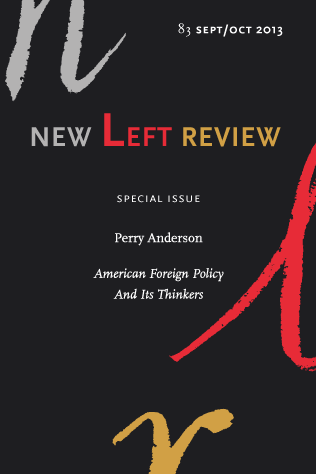
CONTENTS
Preface to NLR 83
This issue of the journal is devoted to a two-part study of American foreign policy by Perry Anderson. ‘Imperium’ examines the objectives and outcomes of us world power; ‘Consilium’, the thinking of its policy elite. nlr has run three special numbers before: Tom Nairn on Europe in 1972, Anthony Barnett on the Falklands War in 1982, and Robert Brenner on the dynamics of manufacturing over-capacity which underlie hyper-leveraged financialization, in 1998. Concerned with leading questions of world politics, Anderson’s contribution can be read as complementary to Brenner’s on the global economy. While ‘Imperium’ pays tribute to a remarkable tradition of non-conformist foreign-policy analysis, by minds across the political spectrum—Spykman, Kolko, Schurmann, Williams, McCormick, Tucker, Johnson, Bacevich, Layne and more—‘Consilium’ engages with current mainstream literature on America’s role in the world and the assumptions of its practitioners. Behind these lie the distinctive repertoire of an American nationalism dating back to Independence, and its evolution into operative ideologies of international leadership. Today, assessments of us power by its own grand strategists are prone to subjectivist mood swings, with little historical sense of the fit or frictions between the twin functions of America’s global hegemony: at once general—guarantor of the economic order of capital as a whole; and particular—promoter within that order of the interests of us firms and banks, or demands of domestic lobbies. In what follows, the tensions between these are traced from the closing stages of the Second World War through the Cold War to the War on Terror, across a half-century in which the build-out of planetary structures for warfare and surveillance in the battle against the ussr would not be retracted but extended after Soviet defeat—even as the us economy became ever more reliant on the expansion of credit, and its rivals increasingly interdependent on it. The outcomes of that nexus are still unfolding. Politically, opposition to the American empire requires no under-estimation of its life-span; its fate remains to be settled.
